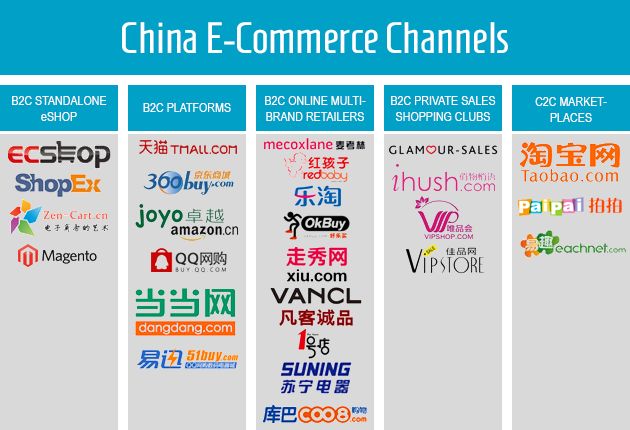Want to sell online in China? With the rise of the digital age and China’s booming economy, the allure of the Chinese market has become nearly irresistible for ecommercebusinesses worldwide. The vast potential of its online consumer base beckons, but the journey to tap into this goldmine comes with its fair share of challenges.
In this article, we'll delve into five actionable tips that can help ecommerce marketers make their mark in the Chinese digital marketplace.
5 E-Commerce Strategies For Selling Online In China
Here are five e-commerce tactics tailored for selling effectively in this dynamic environment.
1. Understanding Chinese Digital Consumption
In the age of the Internet, understanding the dominant platforms is key. Unlike the Western preference for Google, China heavily relies on platforms such as Baiduand Sogoufor online searches. E-commercegiants like Tmall and JD.com dominate the market, with Tmall reporting sales exceeding $84 billion during eventslike 2022’s Singles Day.
Moreover, mobile is at the heart of digital consumption. A staggering 98% of China's internet users access the web via mobile. This has paved the way for brands like Xiaomi and OnePlus, which have optimized their digital presence for the mobile-centric audience.
Another significant factor is the role of influencers. KOLs (Key Opinion Leaders) wield enormous power in shaping purchasing decisions. For instance, brands can experience exponential growth by collaborating with influential personalities on platforms like Douyin, the Chinese counterpart to TikTok.
2. Curating Product Selection
Brands that resonate with the Chinese consumers tend to lean into individualism. With the rise of a globally-aware middle class, there's a move towards products that reflect unique identities. Nike's ‘Nai Ke’ campaign stands as testament, localizing designs to echo with Chinese sentiments.
Quality stands at the forefront of purchasing decisions. This middle class, empowered with rising disposable incomes, prioritizes quality over quantity. For instance, brands like Apple have successfully positioned themselves as emblems of luxury and quality.
Yet, to truly thrive, understanding and incorporating cultural elements is key. Starbucks, for instance, has introduced beverages exclusive to the Chinese market, such as the Dragon Dumpling Green Tea, echoing local tastes.
3. Optimizing Your Online Presence
Local hosting can enhance a brand's digital footprint. Websites hosted within China typically experience better loading times and are favored by local search engines. Recognizing this, international giants like Tesla adopted ".cn" domains upon their Chinese ventures.
Additionally, the ICP (Internet ContentProvider) license, though often challenging to obtain, is pivotal for a smooth online operation within China. It's no surprise that brands like McDonald's and Coca-Cola have secured ICP licenses for their dedicated Chinese websites.
4. Ensuring Seamless Payment Options
The Chinese digital payment landscape is dominated by platforms like Alipay and WeChat Pay. Adapting to this ecosystem can lead to more integrated consumer experiences. Brands such as KFC have innovated by incorporating features like smile recognition payments through Alipay.
Furthermore, while global brands might hold allegiance to providers like Visa, when you sell online in China, collaborations with local payment gateways often bear more fruit. A case in point is Burberry, which integrated WeChat Pay into its retail operations.
5. Exceptional Customer Service
The pace of delivery in China sets a benchmark. With platforms like JD.com offering same-day deliveries, brands need to either match these standards or partner with local entities to ensure rapid fulfillment.
Language and cultural nuances play a significant role in customer service. Brands like Dyson, when venturing into China, invested in not just translations but also in ensuring culturally-relevant communication.
Lastly, feedback mechanisms are essential. Platforms like Pinduoduo revolve around user reviews. A proactive approach to feedback, both positive and negative, can make or break a brand's reputation.
Is It Worth It To Sell Online In China?
The question of whether it's worthwhile to venture into the Chinese online marketplace is one that many businesses, both large and small, grapple with. Given the sheer scale and potential of the market, the allure is unmistakable. However, as with any businessdecision, it's essential to weigh the potential returns against the challenges.
The Promise Of The Chinese Online Marketplace
China boasts over 989 million internet users as of 2022, and this number continues to grow. The Chinese e-commerce market alone is bigger than the e-commerce markets of the U.S., UK, Japan, Germany, and France combined. Brands that successfully tap into this market stand to gain access to an enormous pool of consumers.
The Chinese middle class, now more than 400 million strong, is particularly attractive. This segment of the population has significant purchasing power and a growing appetite for international brands. Whether it's luxury goods, electronics, cosmetics, or even everyday household items, if you offer quality, there's likely a market for it in China.
Challenges To Consider
However, the journey is not without its hurdles. To start with, China's e-commerce ecosystem is vastly different from that of the West. Platforms like Alibaba's Tmall and Taobao, JD.com, and Pinduoduo dominate the landscape, and understanding their intricacies is crucial.
Moreover, cultural nuances play a massive role. For instance, Singles' Day (11/11) is an online shopping holiday in China that dwarfs Black Friday in sales. Not capitalizing on such unique opportunities or misunderstanding them can mean missed revenue.
Then there's the matter of regulations. China has stringent rules governing e-commerce, consumer protection, and data privacy. Brands that don't familiarize themselves with these can find themselves in hot water. Plus, there's always the looming potential for trade tensions or shifts in diplomatic relationships, which can impact foreign businesses.
Real-Life Successes And Failures
Numerous brands have found success in China. For example, Apple's iPhone has a massive following, and luxury brands like Gucci and Louis Vuitton see significant sales. Even smaller brands, like the UK's Cambridge Satchel Company, have managed to carve out a niche.
Conversely, some brands have struggled. Companies that tried to replicate their western businessmodels without localizing often faced challenges. Uber is a notable example; they faced fierce competition from local rival Didi Chuxing and eventually sold their Chinese operations to them.
The Verdict
Is it worth it to sell online in China? The answer, as often is the case in business, is "it depends." The potential rewards are vast, but so are the challenges. Brands that are willing to invest the time in understanding the market, adapting to its unique characteristics, and navigating its complexities stand a good chance of reaping significant benefits. However, those that wade in without preparation or a clear strategy might find the waters treacherous.
Overall, while the Chinese online marketplace is undeniably tempting, success requires a nuanced approach. Brands need to be committed, flexible, and ready to learn continuously. With the right mindset and strategy, the rewards can be monumental.
FAQs
What Is The Potential Of Selling Online In China?
China, with its massive digital consumer base, represents a significant opportunity. With a growing middle class, the demand for a variety of products, both domestic and international, has been on the rise.
Which Platforms Are Most Popular For Online Selling In China?
Popular ecommerce platforms include Tmall, Taobao, JD (Jingdong), and Pinduoduo. Each has its own audience and niche, making it essential for sellers to identify the best fit for their products.
Do I Need To Have A Physical Presence In China To Sell Online?
While having a physical presence can offer certain advantages, it's not always a requirement. However, local hosting, a Chinese domain, and certain licenses such as the ICP license might be necessary depending on your business model.
How Do Payment Methods In China Differ From The West?
Chinese consumers predominantly use online payment solutions like Alipay and WeChat Pay. While credit cards are used, these digital wallets are the preferred payment method for online purchases.
Is it necessary to have my website translated into Mandarin?Yes. While many Chinese consumers understand English, a localized website in Mandarin will increase trust, improve user experience, and potentially lead to higher conversion rates.
What Is The Role Of Social Media In Online Selling In China?
Chinese consumers heavily rely on social mediaplatforms like WeChat, Weibo, and Douyin (TikTok in China) for product recommendations and reviews. Collaborating with influencers and integrating social commerce strategies can be highly beneficial.
Are There Any Regulations For Selling Products Online In China?
Yes, China has its set of regulations depending on the product category. It's essential to understand and comply with these regulations to avoid potential legal issues.
What's The Importance Of Customer Service When Selling Online In China?
Chinese consumers have high expectations regarding customer service. Offering fast delivery, easy returns, and having customer service representatives fluent in Mandarin can significantly enhance the shopping experience.
How Can I Handle Logistics When Selling Online In China?
Several third-party logistics providers operate in China. They can help in warehousing, inventory management, and delivering products swiftly to customers. Alternatively, some ecommerce platforms offer fulfillment services.
What Types Of Products Are In Demand For Online Shoppers In China?
The demand varies but includes luxury goods, techproducts, beauty and makeup, clothing, and health products. It's essential to research and identify market gaps and trends before introducing a product.
Conclusion
Want to sell online in China? Entering the Chinese ecommerce market is undeniably challenging, owing to its unique business landscape and cultural nuances. However, the rewards, in terms of access to a vast consumer base with increasing purchasing power, make it a gamble worth considering.
For businesses that do their research, invest time in understanding the market, and adapt their strategies to cater to local preferences, the Chinese digital market can indeed be a land of vast opportunity.

